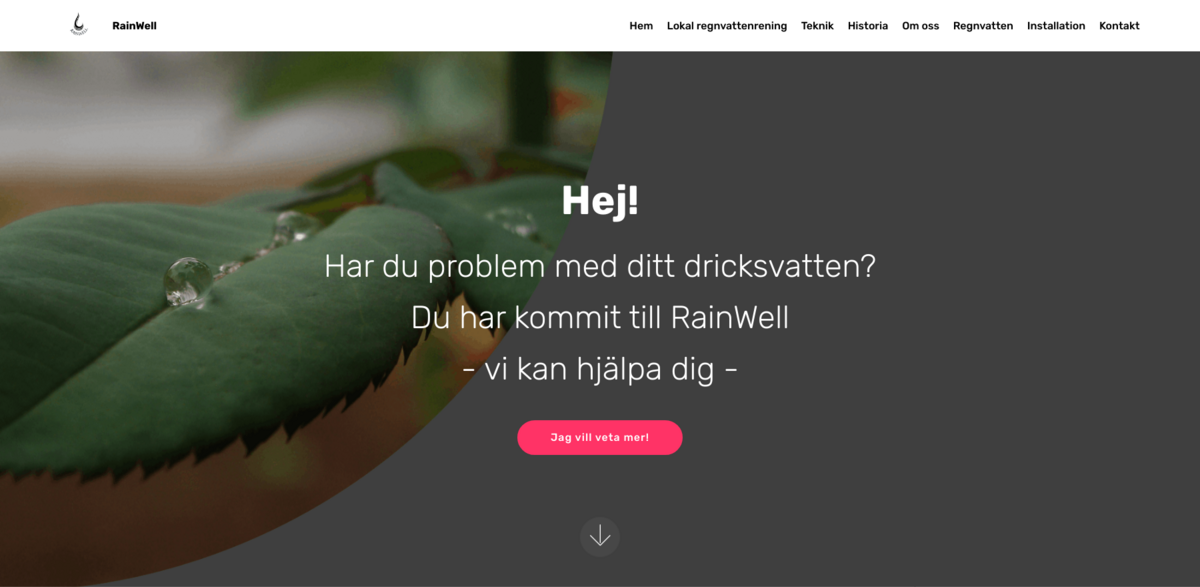What the RainWell Project Is
RainWell is a unique solution addressing drinking water issues for households facing challenges with their water supply. Do you have problems with your drinking water? If so, RainWell could be the answer. The project starts with one simple question: “Do you have problems with your drinking water?” and quickly provides a solution that is as friendly as it is innovative. RainWell is focused on local rainwater treatment where rainwater is transformed into high-quality drinking water using a special purification process that involves a unique tank, precise measurement, and an effective filtration solution—all without adding chemicals. This project proves that even in challenging conditions, fresh, clean water can be reliably produced.
Main Benefit
Key benefits of the RainWell project are highlighted by several impressive figures and facts:
- Purification system capacity to capture between 250 and 10,000 liters of rainwater.
- Production capacity of 30 liters of drinking water per hour, ensuring continuous supply.
- A typical RainWell system always maintains 250 liters of ready-to-use drinking water.
- Capability to operate off-grid using solar cells and batteries, eliminating the need for 230V electricity.
- Modular design that allows integration with existing well solutions to boost water capacity or purify contaminated well water.
Local Rainwater Treatment
The heart of RainWell lies in its approach to local rainwater treatment. This means addressing issues like no drinking water in the house, saltwater in the well, poor well capacity, or even bad water quality in your well. For situations where there is no access to suitable water to purify or limited conditions to install electric purification systems, RainWell steps in as an adaptable solution. The technology ensures that households and communities can transform readily available rainwater into potable water without having to worry about the limitations posed by their well or external infrastructure. It is almost as if the solution was made specifically for those tricky water scenarios… making it both practical and innovative.
Technology
RainWell carefully builds flexible purification systems using a combination of well-known, proven, and sustainable technology. The system is made up of biofilters that work in tandem with sensors and pumps to ensure the incoming freshwater is purified into drinking water. These components are integrated seamlessly into a modular design that not only works effectively with fresh rainwater but can also be connected to existing well systems. It is a technology that moves away from reliance on chemicals, ensuring that the purification remains both circular and sustainable. Moreover, this modern solution can be successfully operated even without a connection to 230V electrical grids—by relying on solar cells and batteries, making RainWell a true off-grid solution. This blend of established filters, precise measurement systems, and automation creates a sense of reliability and efficiency, almost like having a dependable partner in the quest for fresh potable water.
What We Do
The uniqueness of RainWell also lies in its approach to customization. Recognizing that different households have varying water needs, the modular system is carefully tailored to each situation. The process involves three major steps: design, build, and install. First, a design is conceived that addresses the precise conditions and requirements of the installation site; next, this design is brought to life through a careful build of the tailored RainWell system; and finally, the system is installed, connected seamlessly to the rooftop, plumbing, and the necessary infrastructure for optimal operation. This step-by-step process ensures that every installation meets the needs of those who depend on it, providing a reliable solution to local water challenges.
Project Impact
- SDG 6: Clean Water and Sanitation – By ensuring the production of safe drinking water, RainWell directly contributes to the improvement of water quality and availability.
- SDG 7: Affordable and Clean Energy – Operating off-grid using solar energy aligns the project with sustainable practices in energy use.
- SDG 11: Sustainable Cities and Communities – By mitigating urban stormwater issues through an effective rainwater buffer system, RainWell plays a role in building more resilient communities.
- SDG 13: Climate Action – The project addresses the challenges of increasing stormwater from a warming climate, reducing the risk of sewer overflows and water contamination.
History and Team
The story behind RainWell is as fascinating as the technology itself. The idea first emerged in the spring of 2018 when it was observed that the water from a well on an archipelago island began to taste salty. A chemist among the founders pondered whether rainwater—the most readily available source of fresh water—could be managed and purified into drinking water. It became quickly apparent that, although various purification systems exist such as filters, UV purification, and reverse osmosis, none met the specific requirements envisioned: a circular, sustainable solution that operated without chemicals, electricity, or fossil fuels, and did not require frequent maintenance like expensive filter changes. After extensive research and contemplation, the combination system that qualifies as the first RainWell was built in the founder’s backyard in the fall of 2019. Fast-forward to 2024, and a patent for the RainWell technology has been granted—a true milestone in water purification innovation.


















